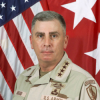John Abizaid

John Abizaid
John Philip Abizaidis a retired United States Army general and former U.S. Central Commandcommander, overseeing American military operations in a 27-country region, from the Horn of Africa, the Arabian Peninsula, to South and Central Asia, covering much of the Middle East. CENTCOM oversees 250,000 US troops. Abizaid succeeded General Tommy Franks as Commander, USCENTCOM, on July 7, 2003, and was also elevated to the rank of four-star general the same week. He was succeeded by Admiral William J. Fallon on...
NationalityAmerican
ProfessionSoldier
Date of Birth1 April 1951
CountryUnited States of America